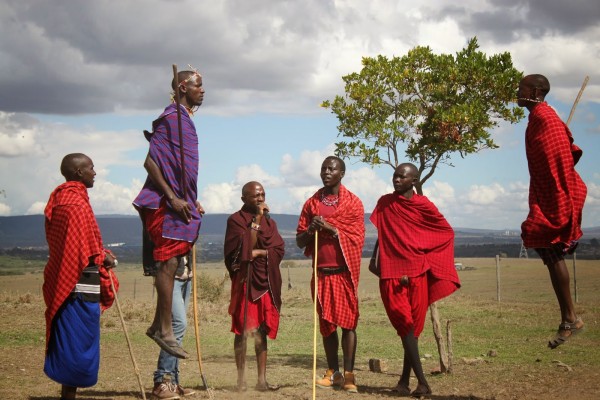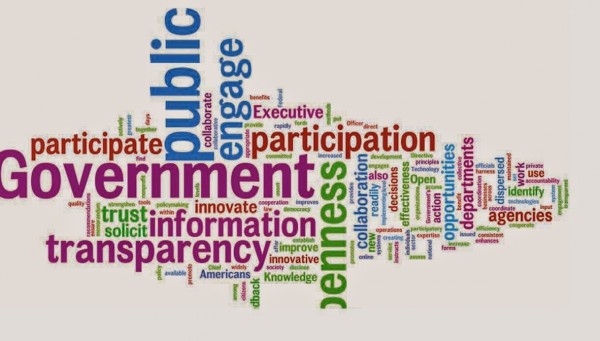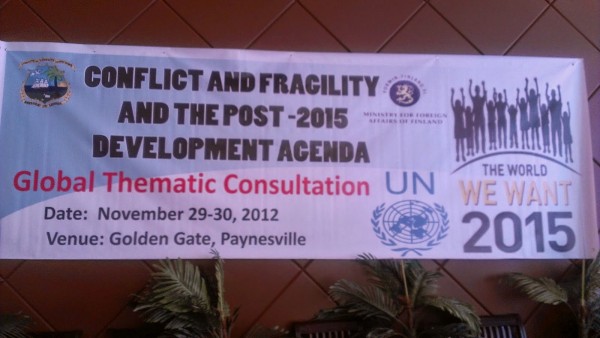Blog
|
November 27, 2014
| Chris Underwood
Chris Underwood, Director Country Programmes at Making All Voices Count, started a discussion on his own blog in reaction to an article by Danny Sriskandarajah, Secretary General of CIVICUS, in this Guardian piece about citizen’s voices post-2015. Making All Voices Count would like to know your opinion.
Citizen voice in post-2015 goals: is anyone listening?
He goes further and asks:
How will sustainable development goals represent the views of all citizens?

Masai
The answers, at least in the confines of NewYork, are straightforward: ‘no’ and ‘they won’t’. I would argue these are the wrong questions anyway. The SDGs, like their MDG predecessors, will represent an intergovernmental political compromise and, one would hope, the best political deal the more progressive voices in those negotiations can secure within the
Open Working Group. Civil society with allies in some governments have successfully established that
business as usual is not an option and shaped some of the content but a political compromise it shall be.
So while there is every reason,
as Saferworld describe for governance and peace, to hope for a better deal; the real question in my mind for civil society rests with the ‘post-post-2015’ era: how will citizens hold individual governments to account for their commitments in the years to come?
Danny quotes the MyWorld survey and the High Level Panel consultations as examples of the many attempts at outreach and consultation that has marked this remarkable process. It’s been a while since Post-2015 was my daily bread and butter but I can think of others too – the UN thematic consultations for example. And while Danny is right to charecterise these initiatives as Northern led he misses out the work of the Beyond2015 civil society coalition. A strange omission as I can remember the membership figures indicating that it hovered between even North/South membership or tilted slightly towards Southern organisations. That was reflected in the voices we sought to seek out and reflect in our own submissions to the process; and was one of the strengths of the coalition.
My question here, is how do we maintain that energy and movement in the post-post-2015 era?

Why would that be important? Because in each of the consultations Danny quotes, citizens from North and South consistently and by very large margins voted for good governance and peaceful societies as among their highest priorities. Way ahead of the exclusively technocratic approach represented by the MDGs. This is because the vast majority of humanity simply wants to make progress ourselves and lay the best possible foundations for our children.
Danny rightly highlights the barriers to entry for civil society to the latest round of consultations, a very good example of which was the non-consultations held by the data-revolution, scathingly depicted
in this piece by Neva Frecheville of Cafod. Set against high air fares and impossible visa demands among others, he rightly argues that it has been impossible for civil society to meaningfully engage at the same level. But that was never going to be the case. I would argue that civil society also never got to grips with what Claire Melamed described as the
“Christmas Tree” phenomenon: where each CSO sought to present their own niche issue as *the* most important thing policy makers had to prioritise. This led to
ridiculous scenes like this during the High Level Panel, prompting Graca Machel to leave the room. I also used to wonder how connected these discussions in capitals were with the
poorest and most vulnerable and whether they needed a reality check; civil society frequently being comprised of elites just like governments.

The World We Want 2015
Yet there is a real opportunity if we raise our eyes to the post-post-2015 horizon. The energy I can remember personally during my time working within the Beyond2015 coalition, at this intense meeting in Liberia and elsewhere is still very much there. In fact it is vibrant, buzzing and healthily restless: I saw this at first hand while leading a packed out session at Civicus’ International Civil Society Week on the subject of ‘brokering new pathways between citizens and their governments’ here in South Africa just last week end.
The real question for me, therefore, is how do we ensure the energy, those connections and that movement which, for all its flaws, the post 2015 process has generated these past few years, stays vibrant and starts to ask the awkward questions of individual governments in the post-post-2015 era about to dawn?
Answers on a postcard, please.
Link to Blog Chris Underwood
Chris Underwood is Director Country Programmes at Making All Voices Count


